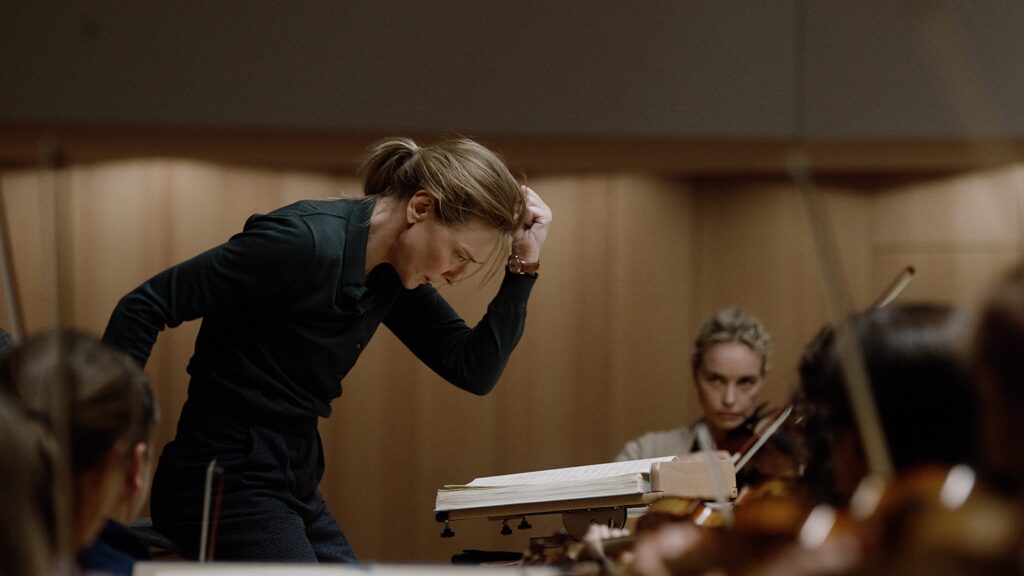Tàr is a beautifully crafted, vapid commentary on cancel culture
Written by Ian Thomas Malone, Posted in Blog, Movie Reviews
Society has long struggled with discourse surrounding the unwieldy leviathan known as cancel culture. The term has become somewhat of a Rorschach test, its definition molded to whatever situation best suits the intentions of the party that invoked its usage. The film Tàr gender swaps the traditional mechanics of the #MeToo movement, centering a manically narcissistic female conductor at the heart of its tale of power and treachery.
Lydia Tàr (Cate Blanchett) is seated at the top of her insulated world. The first female composer of the Berlin Philharmonic, Tàr juggles an upcoming live recording of Mahler’s Fifth Symphony with the release of her memoir, alongside the tedious nature of orchestral politics and heavy travel schedules on private jets between spacious apartments in some of the most beautiful cities of the world. Armed with a hands-on assistant Francesca (Noémie Merlant) to schedule her every move, Tàr structures her entire existence on the endless validation of her own brilliance.
A former student’s suicide throws Tàr’s empire into chaos, the genius lesbian maestro’s taste for younger women a poorly kept secret across her realm. Tàr disrupts the mechanics of the orchestra by elevating a young cellist Olga (Sophie Kauer) who she’s had her eye on even as her wife and concertmaster Sharon (Nina Hoss) looks on in disapproval. The presence of her former mentor Andris Davis (Julian Glover) serves as a stark reminder of how one can go from the top of the mountain to an afterthought lost in the annals of time.
Director Todd Field presents his 158-minute narrative as if it was unfolding in real time over the course of a few days. There’s a marvelous lived-in feeling to the worldbuilding that produces ample natural tension across the slow burn. Much as cancel culture feels like the boogeyman, Field manages to bring the inner workings of #MeToo to life, a highly impressive feat of filmmaking.
The true beauty of Tár stems from the sheer vitality of Cate Blanchett to the whole production. It’s not unfair to say that the entire immaculately crafted film would fall apart without her, a towering presence that commands the whole experience. Field deserves plenty of eye-rolls for using a lesbian as his stand-in for cancel culture commentary that would feel clownish if it had a male lead, but there’s no denying that his synchronicity with Blanchett results in a breathtaking experience.
Much of Tàr’s through-line depends on a pivotal scene between Tár and one of her students in a class she was guest-teaching at Julliard. The BIPOC Gen Z student expresses apathy for the work of Bach as a white male cisgender composer, goading Tár into a fiery rebuke of cancel culture fitting for the primetime programming on Fox News. Field crafts an easy lay-up in his lazily constructed strawman bound to resonate with an audience that probably can’t name many transgender women composers of color, let alone a handful with portfolios of work comparable to the impact and legacy of one Johann Sebastian Bach.
Field does himself and his work a great intellectual disservice by reducing the Bach question to a matter of his gender identity and problematic personal life. At the heart of every academic and artistic institution on this planet lies a canon that defines their very orbit. Modern efforts to diversify the canon harness the raw power of its reality as a living, breathing entity that does not need to forever remain an exclusive club of the only people who were allowed a seat at its table, namely cisgender white men.
An average audience may understandably find it absurd that a student at an institution like Juilliard would not be familiar with Bach. You’d be hard-pressed to go into many classrooms full of Ph.D. students in English Literature who had read more than a handful of Shakespeare’s plays or Dryden’s verse, who could tell their Schopenhauer from their Hegel and certainly could name any Faulkner beyond the few that pop up as Jeopardy! questions. Anyone with half a brain can sound like a pretentious ass while gatekeeping the canon, but the sad truth is that our nation would rather highlight fluff like the assault on cisgender heterosexual white men than debate whether those same anointed few should forever center the conversation within their respected fields.
Another question that Tàr unfortunately tries to sidestep completely is the nature of the impermeability of genius. Many abusers have clung to their perceived Godlike aura to justify further bad behavior. History has shown us time and time again that the success of artistic movements or cultural institutions rarely hinges on the fortunes of singular individuals. The sun still rose the day after Harvey Weinstein’s cancellation just as it would on any other morning. Those in power would sleep better at night if you weren’t aware of that innate truth. Field is not unaware of this dynamic either, but he focuses his attention elsewhere far too often to produce any interesting conclusions on the subject.
Tàr ends up as an unfortunate mix bag, another film about cancel culture that doesn’t really take a stand on its subject material. Field’s pseudo-intellectual script betrays a spectacular exposition on power’s corrosive rot on the genius of the soul, though Blanchett remains perpetually able to pick up the pieces of his shoddy reactionary mess. The end result produces a beautiful film, albeit one that falls just shy of greatness.











